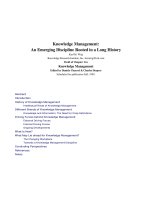knowledge management and management learning
Bạn đang xem bản rút gọn của tài liệu. Xem và tải ngay bản đầy đủ của tài liệu tại đây (24.43 MB, 402 trang )
KNOWLEDGE MANAGEMENT AND
MANAGEMENT LEARNING:
Extending the Horizons of Knowledge-Based
Management
INTEGRATED SERIES IN INFORMATION SYSTEMS
Series Editors
Professor Ramesh Sharda
Prof.
Dr. Stefan Voß
Oklahoma State University Universität Hamburg
Other published titles in the series:
E-BUSINESS MANAGEMENT: Integration of
Web
Technologies with Business
Models! Michael J. Shaw
VIRTUAL CORPORATE UNIVERSITIES: A Matrix of
Knowledge
and Learning
for the New Digital Dawn/Walter RJ. Baets & Gert Van der Linden
SCALABLE ENTERPRISE SYSTEMS: An Introduction to Recent Advances!
edited by Vittal Prabhu, Soundar Kumara, Manjunath Kamath
LEGAL PROGRAMMING: Legal Compliance for RFID and Software Agent
Ecosystems in Retail Processes and
Beyond!
Brian Subirana and Malcolm Bain
LOGICAL DATA MODELING: What It Is and How To Do It! Alan Chmura and
J. Mark Heumann
DESIGNING AND EVALUATING E-MANAGEMENT DECISION
TOOLS:
The
Integration of Decision and Negotiation Models into Internet-Multimedia
Technologies! Giampiero E.G. Beroggi
INFORMATION AND MANAGEMENT SYSTEMS FOR PRODUCT
CUSTOMIZATION/ Blecker, Friedrich, Kaluza, Abdelkafi & Kreutler
MEDICAL INFORMATICS: Knowledge Management and Data Mining in
Biomedicine/
Chen,
Fuller, Friedman & Hersh
KNOWLEDGE MANAGEMENT AND
MANAGEMENT LEARNING:
Extending the Horizons of Knowledge-Based
Management
Edited by
Walter Baets
Euromed Marseille - Ecole de Management
E
C
KM:
Euromed Center for Knowledge Management
4y Springer
Walter Baets
Euromed Marseille
Library of Congress Cataloging-in-Publication Data
Knowledge management and management learning : extending the horizons of
knowledge-based management / edited by Walter Baets.
p.
cm. - (Integrated series in information systems ; 9)
Includes bibliographical references.
ISBN-10: 0-387-25819-1
ISBN-13:
978-0-387-25819-5
ISBN-10: 0-387-25846-9 (e-book)
ISBN-13:
978-0-387-25846-1 (e-book)
1.
Knowledge management. 2. Organizational learning. 3. Management.
I. Baets, W.R.J. (Walter RJ.) II. Series.
HD30.2.K636846 2005
658.4'038—dc22
2005044154
© 2005 by Springer Science+Business Media, Inc.
All rights reserved. This work may not be translated or copied in whole or in
part without the written permission of the publisher (Springer Science +
Business Media, Inc., 233 Spring Street, New York, NY 10013, USA), except
for brief excerpts in connection with reviews or scholarly analysis. Use in
connection with any form of information storage and retrieval, electronic
adaptation, computer software, or by similar or dissimilar methodology now
known or hereafter developed is forbidden.
The use in this publication of trade names, trademarks, service marks and
similar terms, even if they are not identified as such, is not to be taken as an
expression of opinion as to whether or not they are subject to proprietary rights.
Printed in the United States of America.
987654321 SPIN 11053903
springeronline.com
Wanderer, your footprints are
the path, and nothing more;
Wanderer, there is no path,
it is created as you walk.
By walking,
you make the path before you,
and when you look behind
you see the path which after you
will not be trod again.
Wanderer, there is no path,
but the ripples on the waters.
Antonio Machado
A very great musician came and stayed in our house.
He made one big mistake
He was determined to teach me music,
and consequently, no learning took place.
Nevertheless, I did casually pick up from him
a certain amount of stolen knowledge.
Rabindranath Tagore
For Erna, without whom my writings would be stone and my thinking
frozen;
Now, you only see little of her light, but already a difference of day and
night for this book.
CONTENTS
ABOUT
THE A UTHOR
xiii
Introduction 1
Part
2:
Application domains 4
1.
Complexity: an emergent organisational paradigm in the knowledge
based economy 9
1.1 Introduction 9
1.2 The knowledge era 10
1.3 The complexity paradigm 13
1.4
What
should be understood by Knowledge Management: the corporate
view 19
1.5 Research perspective on Knowledge Management 22
2.
The epistemology of knowledge 25
2.1
What
can we learn from the philosophers of science? 30
2.2 Post-modernism comes in fact from architecture 38
2.3 The widest view: a vision of Man and the holistic world 42
3.
The complexity paradigm for a networked economy 47
4.
Knowledge management and management learning: what computers
can still do 59
4.1 Knowledge and Learning 59
4.2 Knowledge Management Technologies 74
VIII KNOWLEDGE MANAGEMENT AND MANAGEMENT LEARNING
4.3 Virtual Learning Technologies 80
4.4 Communication Technologies 83
4.5 The Big Picture 84
5. Supporting Technologies for Knowledge Management 89
5.1 Introduction 89
5.2 Information Retrieval 91
5.3 Basics of information retrieval 93
5.4 Data Mining 104
5.5 Conclusions 112
6. Learning and interaction via ICT tools for the benefit of Knowledge
Management 113
6.1 In troductio n 113
6.2 Learning as a vehicle for Knowledge Management 115
6.3 Machine learning 118
6.4 ICT tools to support learning of human beings 123
6.5 Conclusions 124
7. Seducing, engaging and supporting communities at Achmea 125
7.1 1. Introduction 125
7.2 Communities of Practice at Achmea 126
7.3 The SES Model for community facilitation 128
7.4 KennisNet: an example CoP 134
7.5 Collaboration in Distributed Communities 136
7.6 Conclusions 140
8. Virtual learner-centred solutions for management education and
training 143
KNOWLEDGE MANAGEMENT AND MANAGEMENT LEARNING IX
8.1 Introduction 143
8.2 The case for
e-learning:
revolutionising management education and
training 143
8.3 Management education and
e-learning
145
8.4 Towards a learner-centred application of
e-learning
tools 147
8.5 Applying learner-centred principles to the development of a virtual
learning environment 148
8.6 Experimentation with the Whizzdom learning environment 150
8.7 Research approach 153
8.8 Summary of the findings from the course experiments 154
8.9 Lessons learned from the course experiments 155
8.10 Instructional issues related to the design and delivery of hybrid
learning 158
9. A symbiosis of learning and work-practice 165
9.1 Increased attention for learning 165
9.2 Consequences for organizations and individuals 165
9.3 Integration of learning and work 167
9.4 Adult learning 168
9.5 Integration of learning and working 170
9.6 Research Approach 170
9.7 Summary of the findings from the learning trajectories 171
9.8 Lessons learned 175
9.9 Conclusions 180
10.
Facilitating learning from desigii 181
10.1 Introduction 181
10.2 Research issues 181
X KNOWLEDGE MANAGEMENT AND MANAGEMENT LEARNING
10.3 Research objectives 185
10.4 Preliminary conceptual model 185
10.5 Research settings and activities 187
10.6 Main results 188
10.7 Participation 192
10.8 Evaluation 193
10.9 Negotiation 193
10.10 Creativity 194
10.11 Suggestions for using the DLM
in
practice 194
10.12 Relevance to business and academia 195
10.13 Summary 196
11.
Cultural complexity: a new epistemological perspective 199
//./ Introduction 199
11.2
The
problem of "culture
"
in (learning) organizations 200
11.3 A new perspective on cultural complexity? 203
11.4 What is complexity thinking? 205
11.5 Complexity thinking and
its
principles 208
11.6
What
does complexity thinking mean for the cultural problematic in
organizations? 210
11.7 Conclusion 211
12.
Dialogues are the bread and butter of the organization's knowledge
exchange 213
12.1 Management information systems 214
12.2 Knowledge management 216
12.3 Customer relationship management 216
12.4 Larger purposes and long-term needs and values 218
KNOWLEDGE MANAGEMENT AND MANAGEMENT LEARNING XI
12.5 Task-oriented larger purposes 219
12.6 Social-affective larger purposes 221
12.7 Indicating and recognising larger purposes 221
12.8 Harvesting the fruits: Applying larger purposes to sales conversations
in call centres 224
12.9 The computational model 226
12.10 Experiments 228
12.11 Conclusions 233
13.
The influence of knowledge structures on the usability of knowledge
systems 235
13.1 Introduction 235
13.2 Our empirical research 238
13.3 Conclusions and implications 241
14.
The role of contextuality in process standardization 251
14.1 Introduction 251
14.2 Empirical research 259
14.3 Research object and approach 260
14.4 Results 262
14.5 Description of cases 262
14.6 Environmental features influencing contextuality 264
14.7 Kinds of contextuality with their origins and consequences 266
14.8 Adaptive evolution of knowledge structure 277
14.9 Effects of standardization on knowledge structure 281
14.10
The
process of change 282
14.11 Conclusions 285
15.
Emergent learning processes in innovation projects 287
XII KNOWLEDGE MANAGEMENT AND MANAGEMENT LEARNING
15.1 Introduction 287
15.2 The constructed dualism between innovating and learning 288
15.3
Learning,
complexity and agency 300
15.4 An agent-based simulation: creating an open learning environment
309
15.5 Conclusions and practical implications 314
16.
The dynamics of learning and innovation 317
16.1 Introduction 317
16.2 Assessment of existing theory of innovation 318
16.3 Cybernetics 327
16.4 How can these outcomes be elaborated? 330
16.5 Options for elaboration 330
16.6 Conclusion 338
17.
Knowledge management at Akzo Nobel Car Refinishes
R&D:Improving knowledge creation ability 341
17.1 Introduction 341
17.2 The real life case 342
17.3 The research design 348
17.4 Results 351
17.5 Knowledge creation ability 354
17.6 Bridging the Gap: Complex Adaptive Knowledge Management 355
ABOUT THE AUTHOR
Walter Baets is Director Graduate Programs at Euromed Marseille -
Ecole de Management (F) and distinguished professor Innovation,
Information and Knowledge at Nyenrode University, the Netherlands
Business School. He has been the director of Notion, the Nyenrode Institute
for Knowledge Management and Virtual Education, a competence center
sponsored by Achmea, Atos/Origin, Microsoft, Philips and Sara Lee/DE.
Today he is responsible for the E
C
KM (Euromed center for Knowledge
Management), a research center where he continues his work started in
Notion. He graduated in econometrics and operations research at the
University of Antwerp (Belgium) and did postgraduate studies in Business
Administration at Warwick Business School (UK). He was awarded a PhD
from the University of Warwick in Industrial and Business Studies. He
holds a HDR (Habilitation a la Direction des Recherches) of IAE Aix-en-
Provence (University of Aix-Marseille III). After pursuing a career of more
than ten years in business, he held positions in the academic world in
Belgium, Russia, the Netherlands and Spain, and currently in France. He
was particularly active in management development both in Russia and in
the Arab world.
Walter Baets (co-)authored or (co-)edited amongst others the following
books:
• IT and Organizational Transformation (Wiley, 1998, with Bob Galliers);
• Organizational Learning and Knowledge Technologies in a Dynamic
Environment (Kluwer Academic Publishers, 1998);
• A Collection of Essays on Complexity and Management (World
Scientific, 1999);
• The Hybrid Business School: Developping knowledge management
through management learning (Prentice Hall, 2000, with Gert Van der
Linden).
• Wie orde zaait zal chaos oogsten: een vertoog over de lerende mens (Van
Gorcum, 2002; 'An essay on complexity, knowledge and learning')
• Corporate Virtual Universities (Kluwer Academic,
2003,
with Gert Van
der Linden)
• Complexity, learning and organisations: the quantum structure of
business (Routledge, 2005)
XIV KNOWLEDGE MANAGEMENT AND MANAGEMENT LEARNING
His research and consulting interests are in complexity, innovation,
knowledge management, management learning and the quantumstructure of
organisations.
KNOWLEDGE MANAGEMENT AND MANAGEMENT LEARNING XV
Principle Bio's
Marie-Joelle Browaeys is Assistant Professor of Cross-Cultural
Management and Project Manager in Virtual Education at Nyenrode
University. Her appointment includes the development of pedagogical
materials for virtual education. She studied first in the Department of
Education and Science in Lille (France) and thereafter she graduated (with
honours) at the Faculty of Arts, University of Amsterdam (The
Netherlands). Her research interests are: culture and complexity, and
(e)learning in the business field.
Sunil Choenni is Associate Professor Information Systems at Universiteit
Nyenrode, and at the computer science department of Universiteit Twente,
both in the Netherlands. He holds an MSc in Theoretical Computer Science
from Delft University of Technology and a PhD in Database Design from
Universiteit Twente. Prior to his position at Nyenrode, he was a principal
scientist at the National Aerospace Laboratory (NLR) in the Netherlands.
Stefan van Diessen is application researcher for new technologies at
Akzo Nobel Car Refinishes and has completed his Masters degree in
Management at Nyenrode University, researching knowledge management
and knowledge creation ability in Akzo Nobel coatings R&D context. He
also holds a MSc in mechanical engineering from Eindhoven University of
Technology and has been active in coatings Research throughout his
professional career.
Virginia Dignuni studied Mathematics and Computer Science at both
the University of Lisbon and the Free University of Amsterdam. Currently,
she works at the Intelligent Systems Group of the Institute of Information
and Computing Sciences at the University of Utrecht, where she obtained
her PhD. Her professional experience includes consultancy and development
of knowledge and information systems. Her research focuses on the role of
knowledge in organisations, and the applicability of the agent paradigm to
knowledge creation, sharing and representation.
Machiel Emmering received a Bachelor's degree in Economics, and a
Master's in Business Administration. The contribution in this book is drawn
from his current work, based on his Ph.D. (Nyenrode University), dealing
XVI KNOWLEDGE MANAGEMENT AND MANAGEMENT LEARNING
with organizational learning. His interests include philosophy and
complexity theories, of which cybernetics, cognition, and evolution are the
main perspectives for the research.
Madelon Evers's PhD research focused on developing practical
methods to facilitate collective learning processes in multidisciplinary
design teams working in large organizations (Nyenrode University).
Madelon did a BA in Literature & Theater at University of Toronto and
obtained an MA in Film & New Media studies from the University of
Amsterdam. She has worked as a designer and producer in theater, film, TV,
and multimedia. She set up an educational design consultancy firm, Human
Shareware, in 1995, where she currently works.
Robin Gommers obtained a Master Degree in Management at the
Nyenrode University. Previously he studied Industrial Engineering and is at
this moment working as a business consultant for the PDM-Group. He
focuses on change processes within industries in a bio-technological and
chemical context.
Martin Groen was researcher at Notion on an endowment from
Achmea. He graduated in Cognitive Psychology and Artificial Intelligence
at the University of Amsterdam. Before starting his research career, he
worked as a computer network consultant. In 1998 he started a Masters
course in Information Management at the University of Amsterdam. His
research interests are in coordination, mental representation and learning.
His current research concerns recognition of goals of dialogue partners,
more specifically between (potential) customers and representatives from
the organisation, preparing for a PhD.
Saskia Harkema obtained her PhD at Nyenrode University. She
worked for several years as marketing manager and project manager She has
a special interest in intercultural management, after several years' work as
consultant in that field, and as a result of her upbringing in South America.
She received her Masters in Sociology in 1987 at Universiteit van Tilburg
and Amsterdam, a Bachelors degree in Law at the Universiteit van Tilburg
in 1987 and a Masters in Business Administration from the University of
Bradford in 1998. Her research focuses on innovation and knowledge
management, with a special interest in complexity theory. She works on the
faculty of the Haagse Hogeschool and the University of Utrecht.
KNOWLEDGE MANAGEMENT AND MANAGEMENT LEARNING XVII
Hanneke Koopmans graduated in educational sciences from the Free
University of Amsterdam. She has worked for a number of years at
NOTION, Nyenrode University, on the topic of workplace learning and self
organised learning. She did most of her research on the case of Achmea and
worked there in the Management Development group. She is currently
finalising her PhD.
Pieter van Eeden studied social psychology and philosophical
aesthetics at the University of Amsterdam. As knowledge officer for
Achmea he was tutor and mentor of a group of PhD researchers, specializing
in a variety of knowledge management areas, also at Achmea. Pieter van
Eeden is professor at the University of Amsterdam and the HKU Utrecht
school of Arts. His professional expertise includes consultancy, marketing
research and group decision support systems. Pieter van Eeden is owns a
research company, Cadre bv, based in Amsterdam.
Erwin van Geenen (1971) received an M.A. (cum laude) in
International Relations and Economics from the School of Advanced
International Studies (SAIS) of the Johns Hopkins University, Washington,
D.C., US, and an M.A. (cum laude) in Cognitive Science from the
University of Nijmegen, the Netherlands. He got his PhD from Nyenrode
University. He has been affiliated with the Matsushita Institute of
Government and Management, Chigasaki, Japan (1995) and the Institute of
Southeast Asian Studies (ISEAS) in Singapore (1996). From 1998 to 2000
van Geenen worked at the Dutch Department of Economic Affairs as a
policy advisor. Currently he is special advisor to the Board of the University
Medical Centre of Utrecht.
Hans van Leijen researched the role of organizational learning in
business process change and integration. Besides conducting research at
Nyenrode, Hans worked for Achmea, a Dutch financial services provider
and part of Eureko, as a consultant in business integration projects.
Previously he was an IT consultant in the area of knowledge-based systems
for risk assessment in the financial services industry. He received his
Master's degree in Cognitive Artificial Intelligence from Universiteit
Utrecht. He is currently working as consultant for McKinsey.
XVIII KNOWLEDGE MANAGEMENT AND MANAGEMENT LEARNING
Richard Walker did his PhD at Nyenrode University, the Netherlands,
concentrating on the potential of virtual learning. He was sponsored by
Microsoft to work as a researcher and course designer within Notion, the
Nyenrode Institute for Knowledge Management and Virtual Education. He
worked in many educational projects around the world, after obtaining his
Masters in History from Oxford University. He is currently undertaking
research on virtual learner-centred solutions for competency-based
management education at the University of York (UK).
INTRODUCTION
Over the last few years, both knowledge management and management
learning (including e-learning) have received sufficient coverage in
publications. I am glad to refer, amongst others, to my own publications
with Gert Van der Linden: The Hybrid Business School: developing
knowledge management through management learning (Prentice Hall,
2000);
and Virtual Corporate Universities: a matrix of knowledge and
learning for the new digital dawn (Kluwer Academic, 2003). However,
most books/articles are often based on one prevailing focus (be it human
resources, IT, strategy, evaluation of intellectual assets), and most of them,
if not all, based on a very rational, mechanistic view of knowledge
management. Practice, on the other hand, has taught us that knowledge
management and learning are highly holistic concepts, difficult to grasp in
any particular subfield, emergent, constantly changing. Measurement and
rationalisation have lead to a very technology driven development of
knowledge management that in practice (in companies) has often failed.
Therefore, there is a need for research and publications embracing that
holistic focus on knowledge management, covering a wide range of
interesting areas (ranging from learning in the workplace to knowledge
infrastructure, via e-learning, knowledge representation, innovation and
learning, knowledge culture and learning, knowledge technologies, etc).
With that aim, a number of companies (Philips, SaraLee/DE, Achmea,
Atos/Origin and Microsoft) have sponsored a research team, under my
direction, for a period of five years, in order to explore new approaches in
knowledge management and learning which have practical relevance. The
companies shared a common interest: how can we avoid reinventing the
wheel every day, and how can we learn faster from past experience in order
to avoid repetitive error? The immediate field of action was very often the
improvement of innovation management.
The paradigm chosen for these research projects, in order to realise that
holistic view required, is the complexity paradigm: dynamic and non-linear
systems behaviour. NOTION (The Nyenrode Institute for Knowledge
KNOWLEDGE MANAGEMENT AND MANAGEMENT LEARNING
Management and Virtual Education), and in particular
myself,
have hosted
and tutored these projects. The outcome is a number of new and promising,
practically relevant approaches to knowledge management and learning,
researched in real life companies. Most of them are not yet researched on at
all,
and jointly they cover the broad range of knowledge management, as it
is seldom dealt with in a knowledge management book. That is the
particular contribution of this book. It defines the knowledge management
field much more broadly than has been done before, and it immediately
gives relevant and workable approaches. Therefore I am happy to be able to
make the claim that knowledge management is not just another hype, as
some have suggested, but if defined with enough breadth, it is a vision of
management that applies to the knowledge based company.
Now that NOTION is about to deliver its lessons, in the form of a
number of PhD theses, it is interesting to report the NOTION experience in
a book, available on the market. From the outset of this program, the aim
was to explore the boundaries of current practice in knowledge management
and management learning, mainly from a dynamic systems angle
(complexity). NOTION did not have a clean and nicely preset research
agenda. Rather, the researchers themselves, in dialogue with the tutor,
shaped their own PhD. The least one can say is that the research undertaken
was emergent in nature; so is the field of knowledge management. NOTION
indeed became an interdisciplinary research group, where theory of different
scientific fields is brought together with the perspective of improving
business.
In fact, this book suggests an interesting and challenging research agenda
for knowledge management in the years to come, without neglecting to
deliver usable solutions for real life problems right away.
After an extended introduction and theoretical framework, different
researchers contribute to a further deepening of a series of sub themes in
knowledge management. Those contributions focus both on the theoretical
framework and the practical consequences, and in doing so, suggest many
lessons learned which will be of use in practice.
The introductory theory and framework for the different projects is
compiled out of a number of my earlier books:
KNOWLEDGE MANAGEMENT AND MANAGEMENT LEARNING
• Bob Galliers and Walter Baets, Information Technology and
Organizational Transformation, Wiley , 1998
• Walter Baets, Organizational learning and Knowledge technologies in a
dynamic environment, Kluwer Academic, 1998
• Walter Baets, A collection of essays on complexity and management,
World Scientific, 1999
• Walter Baets and Gert Van der Linden, The Hybrid Business School:
developing knowledge management through management learning,
Prentice Hall 2000
• Walter Baets, Wie orde zaait zal chaos oogsten (Dutch version, The one
who sows order harvests chaos), Van Gorcum, 2002
• Walter Baets and Gert Van der Linden, Virtual Corporate Universities: a
matrix of knowledge and learning for the new digital dawn
Complexity: an emergent organizational paradigm in the knowledge
based economy gives a general introduction to the theory and paradigm on
which this book is based. A logical follow up is The epistemology of
knowledge in which the necessary epistemological choices are discussed.
The complexity paradigm for a networked economy is a detailed description
of complexity theory. The introductory chapters conclude with Knowledge
Management and Management Learning: what technology still can do, in
which I give an account of what I think is interesting in knowledge
management and virtual learning today. It is the somewhat more knowledge
technology oriented continuation of the earlier chapters.
Three more chapters have a more general nature, dealing with aspects of
knowledge management, rather than with applications. Supporting
technologies for Knowledge Management (Sunil Choenni, Henk Ernst Blok,
and Robert de Laat) deals in detail with the technological side of knowledge
management. Learning and interacting via ICT tools for the benefit of
Knowledge Management (Sunil Choenni, Saskia Harkema, Robin Bakker)
reports particularly on the use of agent-based simulations as a visualisation
of emergent systems behaviour, for the very simple reason that these
technologies are applied in later chapters. Finally, Seducing, engaging and
supporting communities at Achmea (Virginia Dignum and Pieter van Eeden)
gives a first corporate account of how they understand knowledge
management.
The second part of the book deals with application domains.
KNOWLEDGE MANAGEMENT AND MANAGEMENT LEARNING
Part
2:
Application domains
A first set of three chapters describes more learning-related projects.
Virtual learner-centred solutions for management education and training
(Richard Walker) investigates the do's and don'ts of virtual learning based
on real life cases. This chapter suggests an approach, relevant for corporate
universities alike, for developing workable virtual learning applications:
applications that support students in their learning. In A symbiosis of
learning and work practice (Hanneke Koopmans) the often neglected
concepts of workplace learning is studied and based on a real life project,
suggestions are made how to integrate learning and working for the
improvement of both. Facilitating learning from design (Madelon Evers)
explores the phenomenon of, and suggests a methodologyfor, the use of
design teams (for information systems) for group learning. Too often, the
knowledge that is created during design gets lost for the company.
Cultural complexity: a new epistemological perspective (Marie Joelle
Browaeys and Walter Baets) gives a fresh insight into culture and
complexity. In general, culture is considered as a static phenomenon and it
would be enough to understand the other's culture in order to deal with it.
In practice this does not really seem to be reality. Culture (be it national or
corporate culture) is an emergent and constructed concept that is highly
dynamic and non-linear.
The remaining chapters all deal with a specific aspect of knowledge
management. Dialogues are the bread and butter of the organisation's
knowledge exchange (Martin Groen) investigates the role of language in the
creation of possible common ground between company and client. This
chapter is highly relevant for people interested in e.g. knowledge creation
and management in call centers. It equally gives a fresh insight into the
potential (and limitations) of CRM. The influence of knowledge structures
on the usability of knowledge systems (Erwin van Geenen) attempts to give
insight into the qualities required for knowledge systems, in order to
improve the usability. It reports on different knowledge representations,
both symbolic and sub-symbolic (neural networks). The role of contextuality
in process standardization (Hans van Leijen) investigates the difficulty in
mergers and acquisition of standardizing the different processes. Based on
the prime importance of the context, it is suggested that the first step should
KNOWLEDGE MANAGEMENT AND MANAGEMENT LEARNING
be to merge the knowledge infrastructures (infrastructure understood as
systems, content and context) before embarking on process integration. This
chapter opens doors to an improved understanding of the difficulties of
BPR.
A last group of three chapters studies the contribution of knowledge
management to innovation (management) in companies. Emergent learning
processes in innovation projects (Saskia Harkema) uses the knowledge and
learning model developed in the first chapters of this book and applies it to
innovation management. Having redefined innovation as learning, agent
based simulations are used in order to illustrate innovation as an emergent
learning process, thus suggesting key success and failure factors for
innovation. The dynamics of learning and innovation (Machiel Emmering)
continue that line of thinking but generalise it a bit more. This chapter
suggests an adapted vocabulary, or 'context', for innovation to flourish in a
company. Suggestions are made on how corporate innovation repositories
might be of help in capitalizing faster on learning from innovation projects.
Knowledge Management at Akzo Nobel Car Refinishes R&D - Improving
the Knowledge Creation Ability (Robin Gommers and Stefan van Diessen) is
a theoretically-sound case study of the contribution of knowledge
management to the improvement of innovative power in a division of Akzo
Nobel.
This exceptional range of contributions, all within the same, and
explained in detail, paradigm, make this book valuable for both academic
and practical use. One the one hand there is the academic, teaching in the
field of knowledge management and management learning, in search of a
book covering the broad range of aspects that have to do with knowledge
management. Though it is not really meant to be a handbook, it could be
used as course support material, where the different chapters each cover a
relevant area. Alternatively, the book can be used as a second source.
On the other hand, and given that all projects are undertaken in close
cooperation with business and therefore are based on a business agenda, the
chapters cover all knowledge management applications that matter to
business. The book illustrates why and how knowledge management is
important for companies. The hype is over but the corporate need is still
there. Corporate readers will not only appreciate the wide range of
embedded projects covered, they will also gain insight into the how's and
KNOWLEDGE MANAGEMENT AND MANAGEMENT LEARNING
why's of the proposed approaches, which makes them transferable to
different situations.
Where to go from here?
In the mean time I moved to the South of France where I am currently
Director of Graduate Programs at Euromed Marseille - Ecole de
Management and coordinator of a research centre: E
C
KM, the Euromed
center for Knowledge Management. The research agenda of this centre has
been developed in my "habilitation thesis" (HDR - Habilitation ä la
direction des recherches; mandatory in order to be allowed to have PhD
students in France). The thesis was entitled: « Une Interpretation Quantique
des Processus Organisationnels d'Innovation» and part of it will be
published in 2005 by Routledge under the title « Complexity, learning and
organisations: the quantum structure of business ». In that thesis I suggest a
somewhat radical rethinking of managerial theory, replacing our strictly
causal approach (from cause to effect) by a more synchronic approach
(occurring together in time). Chains and hierarchies are replaced by
interacting individuals in networks. Behaviour is not managed, but emerges.
It really opens the perspective up on different understanding of
management, in which the triangule "knowledge, learning and innovation"
only becomes more important. There is, of course, too much to summarize
here,
but it is this theoretical development that has enriched my research
agenda for what is currently the EcKM research agenda.
Without being limitating, the topics that are going to get my attention in
the decade to come are the following:
• Is there something like a quantum structure existing in management and
what would be its structure (what is e.g. the role of consciousness,
synchronicity, emergence and morphogenetic fields, etc.)?
• Can we show empiric evidence for the emergent character of
management concepts, and in particular for knowledge management and
innovation?
• Are Complex Adaptive Systems capable of visualizing emergence and
synchronicity?
• Can we improve our understanding of the crucial role that knowledge
management, learning and innovation play in a company, and by
answering the previous questions, can we make these concepts more
KNOWLEDGE MANAGEMENT AND MANAGEMENT LEARNING
applicable and usable for companies? My research interest was and still
is mainly focused on the triangle "knowledge, learning and innovation".
I am convinced that the difference in management is made by the
adequate understanding and use of this triangle. In my opinion, this
importance is only increasing.
I hope I will be able to report you more exciting research findings in the
years to come. For the time being, I wish you lots of learning and pleasure
with this book.
Other than the sponsors and researchers who have contributed
substantially to the success of this book, I like to thank specially Karen Ray
and Claude Spano for helping in the preparation of the final version.
Walter Baets
Aubagne, December 24, 2004






![data mining and machine learning in cybersecurity [electronic resource]](https://media.store123doc.com/images/document/14/y/op/medium_hJlflZCPev.jpg)


